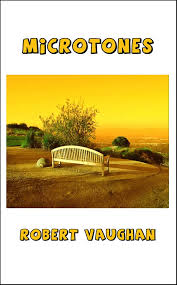~by Meg Tuite
36 pgs/$7.00
Robert Vaughan struck me as a shining star in the cosmos of flash fiction from the moment I read his first story online a few years back. He works those gray areas of fiction; mixed genre stories that are hard to classify, encompassing both poetry and prose in tightly packed tales that don’t lose the elements of plot, character, point of view or theme within the brevity of his pieces.
Microtones is an excellent composite of his published works–now tipping the scale at over 300 stories and poems in literary journals around the world. This collection of 24 prose pieces wraps us in his bold, poetic language.
In Vaughan’s opening story, “The Outlaw,” there are only twelve lines and yet, in this compact piece the nature of a relationship between the narrator and his fear of this man he has known for sometime is fully depicted. “I slice my pinkie while he watches me chop carrots in his kitchen.” The narrator attempts to prove to himself that this is a good man asking him to move in, but his actions tell us otherwise. “The water runs over my finger, the cool liquid mixes with my blood. I watch my future run down the drain.” Each of the stories in Microtones gives us a lot of meat on the bones of these compressed structures. In “Summer of ’66,” a relationship moves from birth to demise, from summer to Fall in ten lines, ‘We knew how to appreciate the little we had,” to “sought truth, but never found it,” to “we were drenched in silt by late August.”
Vaughan delves into deep waters. He pulls us under without an oxygen tank into the secrets that humanity and family try to drown us in. A drunk father is “an accident waiting to happen,” in the story “Wrestling With Genetics.” It portrays a son trying to relate to his father, who is so far from any connection that the son sees him as an “ailing pickled heart sitting in a laboratory glass jar on a top shelf too high to reach.” In “Stand Here,” a couple grasps to hold onto something already dead, “the leaving took half his life because it was uphill.” And the infernal abyss of incest yawns in “My Bicycle,” where a character recounts, “beard, his beer breath, deck of cards, his left foot brushed, no, rubbed my leg, the zipper of the open tent shut.”
The rhythm and vividness of Vaughan’s prose is expansive, powerful and unforgettable. The character’s lives are deeply excavated, blasting us directly to the core of their pain, denial, love affairs, secrets and yet, such urgency and conflict arise in so few words. This is what holds Microtones together as a collection, as well as the possibility that the narrators may be different, but a thematic story holds together throughout of love, betrayal and grief. It had me questioning whether it was the same family. “If only I could tell where one stone ends…”
Either way, it doesn’t matter. This is an observant, insightful narrator that doesn’t hold back on anything. Vaughan has the dexterity to create these entire worlds, layered and complete in one or two pages. This is what he excels at. He sucks us into his luminous vortex with guts, humor and grit. Microtones is as much about transcendence as falling. It is all of life. Vaughan breaks through the subterfuge of the unsaid and lets us “face gravity head-on.”
This is a fearless collection reminiscent of Lydia Davis that takes us on a “free-fall” of a ride we want to jump back on over and over again.
***
Meg Tuite’s writing has appeared in numerous journals. She has been nominated several times for the Pushcart Prize. She is fiction editor of The Santa Fe Literary Review and Connotation Press, author of Domestic Apparition (2011) San Francisco Bay Press, Disparate Pathos (2012) Monkey Puzzle Press, Reverberations (2012) Deadly Chaps Press, Bound By Blue (2013) Sententia Books, Her Skin is a Costume (2013) RedBird Chaps and Bare Bulbs Swinging (2014) Artistically Declined Press. Her blog: http://megtuite.wordpress.com.
![[PANK]](https://pankmagazine.com/wp-content/themes/pank/assets/images/pank-logo-large.png)

